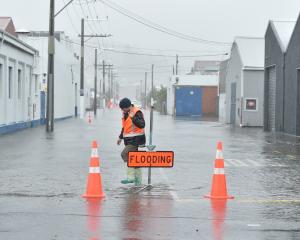Putting the handbrake on climate change might bean taking the foot off the gas, writes Tom McKinlay.
Ah, the car. Is there a better place in the world? It's upholstered, wired for sound, warm, mobile, and if manufactured in the past couple of decades, it probably has cupholders too.
Whoever came up with that combination was a genius.
But there are some welltravelled issues associated with our favourite quadruped. Peak oil, climate change, deepsea oil drilling: the list goes on.
The question posed in the penultimate class of the Sustainable Living Programme's eightweek course is whether it is time for a change.
So what's the case for that?
Well, at a global level, 15% of greenhouse gas is generated by transport. An International Transport Forum report in 2010 estimated that if business were to continue ‘‘as usual'', CO2 emissions from transport would increase 40% by 2030 (it would have been more if not for the Great Recession).
Here in Dunedin, private transport consumes about 75% of imported petrol and diesel fuel. Indeed, about 95% of all travel in Dunedin is undertaken by private vehicles.
This we know from a report prepared for the Dunedin City Council, Peak Oil Vulnerability Assessment for Dunedin. It makes a compelling case that change is coming whether we like it or not.
The report says a 50% to 75% reduction in world oil supply is likely by 2050 and there is a betterthaneven chance of further oil shocks on the way to that destination.
Transport energy efficiency must improve, the report says.
Fortunately, we have a lot of room for improvement. Dunedin's fleet is not particularly efficient, operating on more than 10 litres per 100km. As the report puts it, such lowefficiency vehicles drain money from the Dunedin economy and send it overseas.
On average, we the residents of Dunedin engage in more than 15 trips to activities per week. More than 50% of trips are social visits, recreational or to accompany someone. About 30% of trips are for work and education.
A fair bit of our running around is short trips, half less than 6km, many of which could be completed on foot, or by bicycle or bus.
While at the moment these are matters of choice, the peak oil report says this may not always be the case.
In a world with less oil to burn, productive uses will get first call.
There are simple ways to start cutting transport bills and the attendant environmental costs now, according to the Sustainable Living Programme.
Removing the roof rack when not in use cuts drag and the fuel burned. Similarly, removing weighty articles from the boot that you do not need to drive around will help.
Keep the vehicle tuned and the tyres correctly inflated, and where it is safe to do so, cruise on the open road at 90kmh rather than 110kmh and save at least 20% of fuel. Once the car gets up to 50kmh, wind up the windows.
Thereare lots more ideas at www.sustainableliving.org.nz












